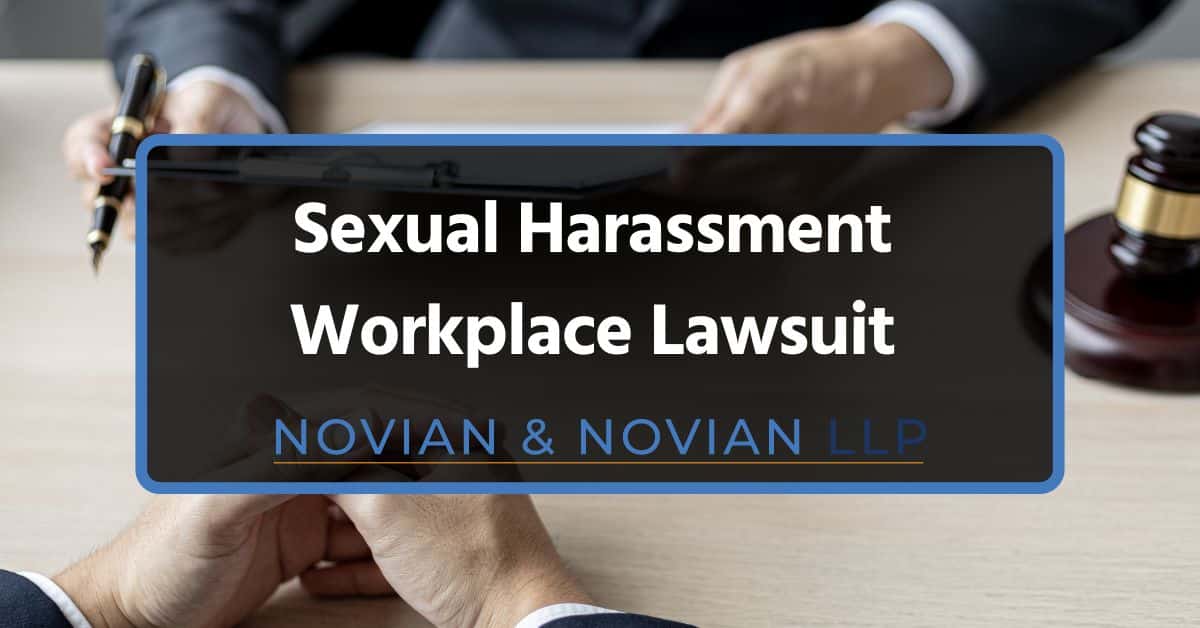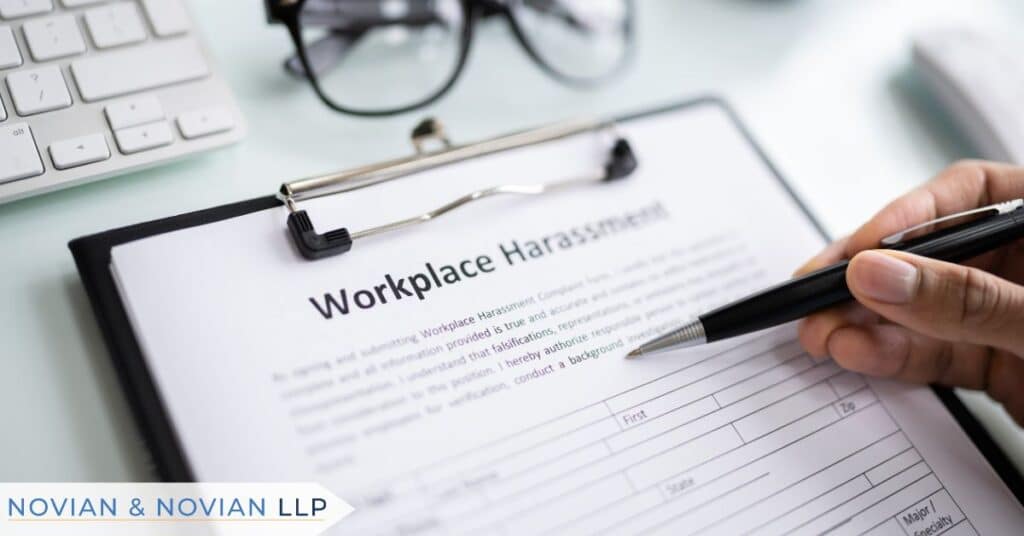
| June 12, 2024 | Employment Law
Sexual harassment in the workplace is defined as unwelcome sexual advances, requests for sexual favors, and other verbal or physical conduct of a sexual nature. These are actions that either explicitly or implicitly affect an individual’s employment, unreasonably interfere with their work performance, or create an intimidating, hostile, or offensive work environment.
The issue of sexual harassment remains a pervasive issue in many workplaces but remains underreported. According to the National Sexual Violence Resource Center, only 38% of all women and 14% of all men report workplace sexual harassment annually. The impact of workplace sexual harassment on victims can include emotional distress, decreased job satisfaction, and impaired mental and physical health. For organizations, the consequences include decreased productivity, reputational damage, and legal costs.
When a business receives a sexual harassment lawsuit, it must first respond to the lawsuit. Therefore, businesses must understand the concept of sexual harassment lawsuits to mitigate risks and ensure compliance.
If your business is facing a sexual harassment lawsuit or you need to establish robust preventive measures or legal defense, Novian & Novian can help. Backed by more than 30 years of experience, our sexual harassment claims defense lawyers are dedicated to protecting your business and ensuring compliance with the law. Schedule a free consultation with us today to discuss how we can safeguard your organization.
In this blog, we will talk about how employers can mitigate lawsuits on sexual harassment in the workplace.
What is Considered Sexual Harassment in California?
Sexual harassment in California is defined under both state and federal law. The primary laws include the Title VII of the Civil Rights Act of 1964, and the California Fair Employment and Housing Act (FEHA). These laws are meant to provide robust protections for employees.
Generally, sexual harassment in the workplace can be classified into quid pro quo harassment and hostile work environment harassment. Examples of behaviors that constitute sexual harassment include unwanted sexual advances, sexual comments or jokes, inappropriate touch or groping, displaying sexually explicit images, and making offensive comments about someone’s sexual orientation or gender identity.
The impact of sexual harassment on victims usually affects both their mental health and professional life. Psychologically, it causes emotional distress, anxiety, depression, loss of self-esteem, and post-traumatic stress disorder (PTSD). In terms of professional impact, it can lead to decreased job satisfaction and productivity and loss of career opportunities and professional development.
Sexual Harassment in the Workplace Lawsuit
Under federal law, the Title VII of the Civil Rights Act of 1964 protects employees from sexual harassment. This federal law prohibits discrimination based on sex, which includes sexual harassment, in any aspect of employment. On the other hand, there are also state laws that provide additional protection. In California, the Fair Employment and Housing Act (FEHA) specifically prohibits sexual harassment and often provides broader protections than federal law. This means that FEHA laws are more inclusive as more workers in smaller businesses are protected under California law.
To file a sexual harassment lawsuit, the plaintiff must be an employee or applicant covered under the laws. There also has to be proof that the behavior in question was unwelcome and the harassment must be based on the plaintiff’s sex, gender identity, or sexual orientation. In addition, the conduct must be severe or pervasive enough to create a hostile work environment or result in a tangible employment action (quid pro quo). Furthermore, the plaintiff has to prove that the employer knew or should have known about the harassment and failed to take appropriate action.
Before filing a lawsuit, the employee should report the harassment to their human resources department or follow the company’s reporting procedures. If the issue is not resolved internally, the employee can file a complaint with the Equal Employment Opportunity Commission (EEOC) or the California Department of Fair Employment and Housing (DFEH). After the EEOC or DFEH investigates the complaint, they may issue a “right to sue” letter, allowing the employee to proceed with a lawsuit in court.
Importantly, company policies and procedures are necessary as clear policies against sexual harassment and regular training can help prevent incidents. These clear policies and procedures demonstrate the employer’s commitment to addressing harassment and can be a defense in lawsuits. Therefore, keeping detailed records of complaints and the steps taken to address them is important for defending against a sexual harassment claim.
How Much is a Sexual Harassment Settlement?
The cost of a sexual harassment settlement can vary depending on the specifics of the case. While the cost of defense settlements for businesses can be around $75,000, sexual harassment settlements can range from $30,000 to $200,000.
In California, thousands of sexual harassment cases are filed each year. According to data from the EEOC, California sees an average of 450 cases yearly. However, sexual harassment cases are still highly underreported.
Types of Sexual Harassment in the Workplace
Sexual harassment in the workplace can be categorized into two primary types; Quid Pro Quo and Hostile Work Environment harassment. Quid pro quo sexual harassment occurs when submission to sexual conduct is made a condition of employment benefits. On the other hand, hostile work environment harassment occurs when unwelcome sexual conduct creates an intimidating, hostile, or offensive work environment.
Reporting Sexual Harassment
To report sexual harassment, follow your company’s reporting procedures. This typically starts by involving the human resources department. Then, file a complaint with the EEOC or DFEH if internal measures are inadequate.
It is also important to consult with a sexual harassment attorney to understand your rights and options. If you need assistance with responding to a sexual harassment claim, contact Novian & Novian for a confidential free consultation. Our experienced attorneys are here to help you navigate the complexities of sexual harassment cases and ensure your rights are protected.
The Lawsuit Process
Before filling a lawsuit, here are some things you must do:
- File a complaint with HR: The first step is to report the harassment to your company’s human resources (HR) department. Follow the company’s established procedures for reporting harassment and sexual abuse, which may involve filling out specific forms or documenting the incidents in writing.
- Document incidents: It is important to keep detailed records of all incidents of harassment. This includes dates, times, locations, descriptions of the behavior, and any witnesses. It also helps to save any relevant emails, text messages, or other communications.
- Internal investigation: The HR department or designated personnel should conduct an internal investigation. This may involve interviewing the parties involved, gathering evidence, and taking appropriate corrective actions.
If the issue is not resolved internally, the next step is to file a claim with the EEOC. This starts by filling the charge of discrimination which can be done online, by mail, or in person at the EEOC office. Then, the EEOC will investigate the claim. They could do this by requisitioning information from the employer, interviewing witnesses, and reviewing documents. The EEOC may offer mediation to help resolve the issue before it goes further. If both parties agree, a neutral mediator will facilitate a settlement discussion. However, if the EEOC finds that there is reasonable cause to believe that discrimination occurred, or if they are unable to resolve the claim, they will issue a “right to sue” letter. This letter allows the claimant to file a lawsuit in court.
Once a “right to sue” letter is obtained, the lawsuit process typically follows these steps:
- Filing the lawsuit: The plaintiff (employee) files a complaint in either federal or state court, depending on the specifics of the case.
- Discovery phase: This involves exchanging information and evidence by both parties. This can include depositions, interrogatories, and requests for documents.
- Pre-trial motions: Either party may file motions to resolve the case or certain issues before trial. For example, a motion to dismiss or a motion for summary judgment.
- Settlement negotiations: At any point, the parties can negotiate a settlement to avoid going to trial. Typically, many cases are settled out of court.
- Trial: If the case goes to trial, both sides present their evidence and arguments. The trial can be before a judge (bench trial) or a jury.
- Verdict: After hearing the case, the judge or jury will render a verdict. If the plaintiff wins, the court will determine the appropriate remedies.
The outcomes of a sexual harassment lawsuit can vary, but may include:
- Compensation: The plaintiff may be awarded compensatory damages for lost wages, emotional distress, and other losses. Punitive damages may also be awarded to punish the employer for egregious conduct.
- Reinstatement: In some cases, the court may order the employer to reinstate the plaintiff to their former position.
- Policy changes: The employer may be required to implement new policies or training programs to prevent future harassment.
- Legal fees: The court may order the employer to pay the plaintiff’s attorney fees and other legal costs.
Depending on the case, other remedies may include back pay, front pay, or specific injunctive relief to prevent future harassment.
Legal Representation for Sexual Harassment in the Workplace Lawsuit
For employees, sexual harassment attorneys provide essential guidance on legal action, helping victims understand their rights under federal and state law. Lawyers also help employees in gathering and organizing evidence and filing claims. Furthermore, attorneys negotiate on behalf of the victim for fair settlements which may include financial compensation and punitive damages for emotional distress, lost wages, and other related costs as they are more adept at negotiating. Additionally, if the case goes to trial, lawyers can represent the victim, presenting evidence and arguments to achieve a favorable verdict.
When it comes to legal defense for employers, employers can benefit from legal representation to build a strong defense against sexual harassment claims. This includes reviewing and defending company policies and actions. Sexual harassment attorneys help employers mitigate risks by advising on compliance with sexual harassment laws, implementing effective workplace harassment policies, and conducting training programs. They also assist in conducting thorough internal investigations into complaints to ensure that all incidents are properly addressed and documented.
In addition, these lawyers negotiate settlements to avoid the high costs and negative publicity of a trial. They typically aim to reach fair resolutions that minimize financial and reputational damage. Additionally, if a lawsuit proceeds to court, legal representatives defend the employer’s interests, presenting evidence and arguments to counter the claims.
What are the Legal Obligations of an Employer in a Sexual Harassment Case
Employers have several legal obligations when it comes to handling sexual harassment in the workplace. These obligations are defined under federal laws.
Some of the key legal obligations include creating a safe work environment, establishing clear policies, providing training, and prompting investigation. Employers should also be open to taking corrective action and prohibiting retaliation.
Preventive Measures and Best Practices for Employers
Employers play an important role in preventing sexual harassment by fostering a respectful and inclusive workplace culture. As an employer, you have the responsibility of creating and enforcing anti-harassment policies, conducting regular training, establishing reporting channels, and encouraging open communication.
Effective policies and training programs are essential tools in preventing and addressing sexual harassment. Clear and detailed policies define sexual harassment and provide examples of unacceptable behavior. They also outline the procedure for reporting harassment, including who to contact and how to file a complaint. These policies would also describe the investigation process and potential disciplinary actions, and include a non-retaliation clause to protect complainants and witnesses.
As an employee, you can protect yourself by staying informed and documenting incidents. You should also report incidents to your supervisor, HR department, or through other established reporting channels as soon as possible. Employees can advocate for a safer workplace by supporting colleagues and leading by example. You can also advocate by providing feedback on your company’s policies and suggesting improvements to make them more effective.
Need a Workplace Sexual Harassment Lawyer?
A sexual harassment lawsuit starts with the pre-lawsuit steps where employees report harassment to HR. If they’re not satisfied with the outcome, they then file a claim with the EEOC or DFEH which gives them permission to go ahead to sue. The legal process involves filing a lawsuit, going through discovery, possible settlement negotiations, trial, and verdict.
Employers must create a safe work environment for employees by establishing clear policies, providing regular training, conducting prompt investigations, taking corrective actions, and prohibiting retaliation. Employers must understand their legal obligations and implement effective policies and training programs to create a safe work environment, while employees should be aware of their rights and the procedures for reporting harassment.
Victims of sexual harassment should not hesitate to seek help and stand up against harassment. This includes reporting incidents, seeking legal advice, and utilizing available resources that can help ensure that justice is served and that a safer workplace is created for all.
If you are facing a sexual harassment issue in the workplace as an employer needing defense, Novian & Novian can provide expert legal representation. We run a Los Angeles Employer Defense Practice with experienced sexual harassment attorneys and business attorneys who are dedicated to protecting your rights and ensuring fair outcomes. Schedule a free consultation with us today!
Contact Us
Have questions about this post? Novian & Novian is a full service law firm in Los Angeles with clients that span the country. Contact us today for a free consultation.
Contact Us
Have questions about this post? Novian & Novian is a full service law firm in Los Angeles with clients that span the country. Contact us today for a free consultation.





